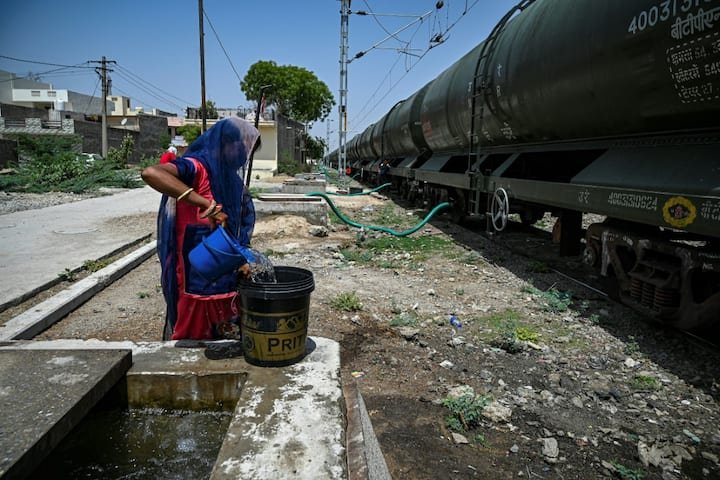Hot!
Most countries ‘woefully unprepared’ for changing climate: analysis

Some middle-income nations lack the infrastructure and
legislative freedom to keep pace with the changing climate.
Photo: Prakash SINGH / AFP/File
Major economies such as India, Brazil and Russia face “cascading” crises driven by climate change such as food insecurity, energy shortages and civil unrest, an industry analysis warned Thursday.
While developing nations of Africa and Southeast Asia are predicted to be worst hit by higher temperatures, extreme weather and sea-level rise, some middle-income nations lack the infrastructure and legislative freedom to keep pace with the changing climate.
And, as Europe counts the cost of another record-shattering heatwave, the analysis showed how even nations with typically few climate-linked crises will need to adapt as global temperatures rise.
The analysis looked at countries’ performances across 32 structural issues — including weather-related events, political stability, economic power, resource security, poverty and human rights — to assess each nations’ capacity to manage crises.
Unsurprisingly, most wealthy nations performed well and were found to be the most insulated against climate shocks thanks to a combination of good governance, purchasing power and robust infrastructure.
Developing nations were mainly deemed to be in the vulnerable category for lacking these safeguards. Several middle-income countries, however, including India, Indonesia and South Africa also fell into this grouping.
Risks will spill over
“The low levels of investment in looking at the secondary risks show that most countries are almost entirely unprepared to deal with the wider political, economic and developmental impacts of a warming planet,” said the analysis.
Will Nichols, head of climate and resilience at consultancy firm Verisk Maplecroft that conducted the assessment, said the major surprise was in the middle — or the “precarious” category — which contained powerhouses such as Brazil, Mexico, Russia and Saudi Arabia.
“A slight change could see it drop into that bottom group and we are certainly seeing the erosion of environmental and social protections under (President Jair) Bolsonaro.
“In Russia, Arctic infrastructure is going to be undermined by warming and you could see a leader like (President Vladimir) Putin point the finger at other groups and seek to expand its territory,” Nichols said.
Although a G20 economy, Mexico landed in the precarious category largely due to its proximity to Central and South American nations such as Venezuela facing extreme climate-linked disruption, particularly in the form of mass migration.
“These risks aren’t contained by political boundaries, they will spill over,” said Nichols.
“Even if you have your house in order, if your neighbour is a basket case that can seriously undermine your ability to protect yourself.”
‘Don’t have resilience’
Under the UN-led climate action plan, rich nations promised in 2009 to provide $100 billion annually to at-risk countries by 2020 but have so far failed to even approach that level of funding.
Nichols said the analysis showed the need for developed countries to help nations that cannot help themselves.
“We’ve seen relatively small amounts of people arriving in Europe and the US due to climate impacts causing major issues,” he said.
“There’s an argument that we as insulated nations have a responsibility to help vulnerable nations to protect themselves, which in turn helps protect us.”
Nichols said this week’s deadly heatwave in Europe was proof that even rich countries needed to factor climate change into future business and governance decisions.
“The scale of the climate threat isn’t diminishing — it is obviously going to have a huge impact,” he said.
“But countries in Sub-Saharan Africa, Southeast Asia and South America don’t have the resilience to manage both the physical climate threat and the knock-on effects of political and supply chain instability.”
Source: AFP
Entertainment
Breaking News: Daddy Lumba is dead – Family announces

Ghanaian music legend Charles Kojo Fosu, popularly known as Daddy Lumba, has died.
His family confirmed the sad news in a press release issued on Saturday, saying the 60-year-old passed away earlier in the day after a short illness.
“It is with profound sorrow and deep grief that the Fosu family announces the passing of Ghana’s beloved musical icon,” the statement read.
Daddy Lumba was one of Ghana’s most celebrated highlife musicians. With a career spanning more than three decades, his songs touched millions, telling stories of love, pain, joy, and hope.
He was known for his powerful voice, emotional lyrics, and unique style that made him a household name across the country and beyond.
“His soulful voice provided the soundtrack to our love stories, and his poignant lyrics captured the poetry of our struggles, dreams, and resilience,” the family said.
The family has asked for privacy as they mourn their loss and promised to announce funeral arrangements in the coming days.
The statement was signed by Fati Ali Yallah, a lawyer from Baba Jamal & Associates, on behalf of the Fosu family.
Fans, fellow musicians, and Ghanaians across the country have started pouring out tributes on social media, remembering Daddy Lumba’s unmatched contribution to Ghanaian music.
Entertainment
Edem’s debut album gets praise from Sarkodie

Ghanaian rap star Sarkodie has celebrated fellow artiste Edem for his groundbreaking debut album “The Volta Regime”, calling it one of the greatest albums in Ghana’s music history.
In a heartfelt social media post, Sarkodie, whose real name is Michael Owusu Addo, reflected on the first time he heard Edem rap.
He said he was instantly impressed and knew Edem would have a serious impact on the music scene.
“I remember when I first encountered my brother Edem, I came back home to tell one of my hommies that this guy will have a serious impact on the music scene,”
“He was like naa because of the language barrier. I said I don’t hear language, I hear greatness. Big up my brother, you are still on my favourite emcee list.” Sarkodie wrote.
Edem, born Denning Edem Hotor, released The Volta Regime in 2009. The album boldly embraced the Ewe language and featured collaborations with top Ghanaian artists including Tinny, Kwabena Kwabena, and Jeremie Van-Garshong.
Despite initial doubts about how well Ewe rap would perform commercially, the album proved to be a major success and introduced a new wave of local-language hip-hop.
Songs like Bra Fre Me, Nyorvuviade, and the powerful Intro helped establish Edem’s lyrical prowess and cemented his place as a unique voice in the Ghanaian music industry.
At a time when the local scene was dominated by Twi and Ga-speaking rappers, Edem’s success broke barriers and made it clear that talent speaks louder than language.
His impact opened doors for more linguistic diversity in hiplife and hip-hop music across the country.
Sarkodie’s tribute is especially meaningful because both artists emerged around the same period. Sarkodie’s own debut album Makye also dropped in 2009, and the two have long shown mutual respect for each other’s craft.
Today, over 15 years after its release, The Volta Regime continues to inspire fans and artists alike. It remains a symbol of bold originality and cultural pride.
Edem has since released several projects and remains an active voice in Ghanaian music and youth advocacy. His legacy is a reminder that true greatness is not limited by language.






